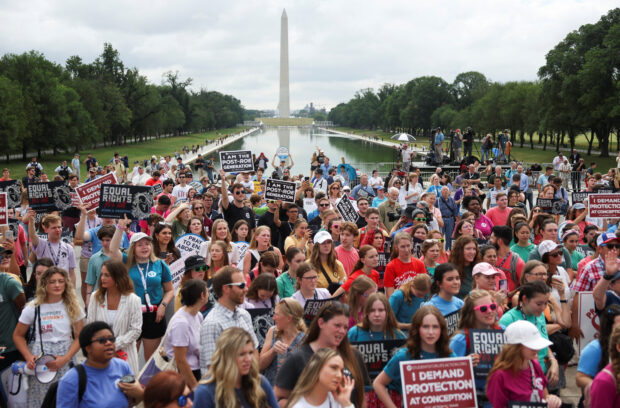
Anti-abortion demonstrators listen as Republican presidential candidate and former U.S. Vice President Mike Pence (not pictured) addresses the “National Celebrate Life Day Rally” commemorating the first anniversary of the U.S. Supreme Court ruling in the Dobbs v Women’s Health Organization case, overturning the landmark Roe v Wade abortion decision, in Washington, U.S., June 24, 2023. REUTERS
Abortion rights supporters and opponents held dueling rallies around the U.S. on Saturday, the first anniversary of the Supreme Court’s decision to overturn the 1973 Roe v. Wade ruling that had legalized the procedure nationwide.
In Washington, speakers from national abortion rights groups, including Women’s March and NARAL Pro-Choice America, assembled in Columbus Circle to celebrate the defeat of some abortion opponents in the 2022 midterm races and to rally voters ahead of next year’s congressional and presidential elections.
Across town at the Lincoln Memorial, anti-abortion groups, including Students for Life America, hosted a “National Celebrate Life Day Rally.” Former Vice President Mike Pence, a 2024 Republican presidential candidate, was among the speakers.
“We’re never going to rest, we’re never going to relent, until we restore the sanctity of life to the center of American law in every state in the country,” Pence said on Saturday at a pre-rally “tele-townhall” for Iowa, the state that will be first to nominate a Republican candidate for president next year.
A live crowd chanted “four more years” in Charlotte, North Carolina, as Democratic Vice President Kamala Harris spoke in favor of national legislation to protect abortion rights. A new Republican-backed law takes effect in North Carolina on July 1, cutting the legal window for abortions from 20 to 12 weeks of pregnancy.
“We know this fight will not truly be won until we secure this right for every American, which means ultimately the United States Congress must put back in place what the Supreme Court took away,” Harris said.
The June 24, 2022, Supreme Court ruling allowed U.S. states to ban abortion care for the first time in nearly 50 years. Conservative states have passed a flood of legislation to restrict the procedure, while other states have moved to protect abortion access.
Near-total abortion bans have taken effect in 14 states in the past year, even as opinion polls show that a majority of Americans want abortion legal in all or most cases.
The issue is expected to remain central in next year’s congressional and presidential races, with activists on both sides using the anniversary to mobilize their base to get more politically engaged.
Leading reproductive rights groups – EMILYs List, NARAL Pro-Choice America and Planned Parenthood Action Fund – on Friday announced their endorsements of President Joe Biden and Harris for reelection in 2024.
‘A wake-up call’
The battle over abortion access is mobilizing candidates as well as voters. The overturn of Roe v. Wade helped convince Democrat Cheyenne Hunt, an attorney and advocate for progressive causes, to run for office in a California congressional district currently led by an anti-abortion Republican.
At an Orange County rally on Saturday to celebrate LGTBQ Pride and decry abortion restrictions, Hunt, 25, said in an interview that the Supreme Court ruling prompted her to run for office at a younger age than she might have.
“Being a young woman in a country where I now have less rights than my mother and grandma did, it’s a dire sign and a wake-up call to many of us Gen-Z women,” she said.
Although California currently has strong reproductive rights protections, some abortion opponents are pushing Congress to pass a federal ban on abortions after 15 weeks of pregnancy while Democratic U.S. lawmakers proposed a measure on Thursday that would protect abortion patients and providers from criminalization nationwide. Passage of that measure is unlikely in this deeply divided Congress.
Pence, an outspoken abortion opponent, said at a Faith & Freedom Coalition gathering in Washington on Friday that “every Republican candidate for president should support a ban on abortion before 15 weeks as a minimum nationwide standard.”
Several of his rivals, including former President Donald Trump and Florida Governor Ron DeSantis, have voiced support for abortion restrictions, without making specific pledges. DeSantis signed a law in Florida this year banning abortions after six weeks of pregnancy.
About 64% of respondents in a Reuters/Ipsos poll in May said they were less likely to support a presidential candidate who backed laws severely restricting abortion, while 36% said they were more likely to back such a candidate.
Rallies, marches and concerts in favor of reproductive rights also took place on Saturday in states from Florida to Oregon.
RELATED STORIES